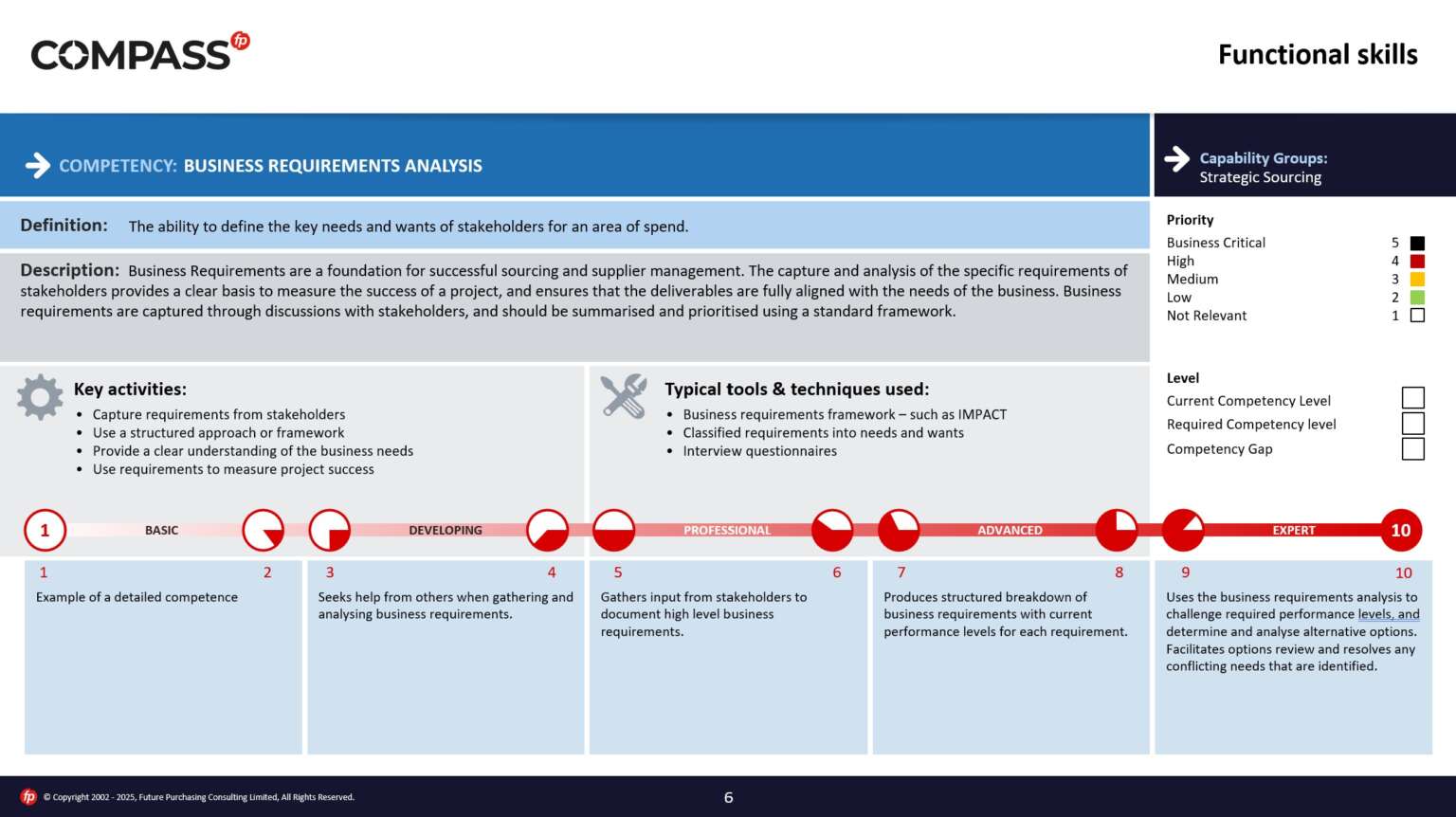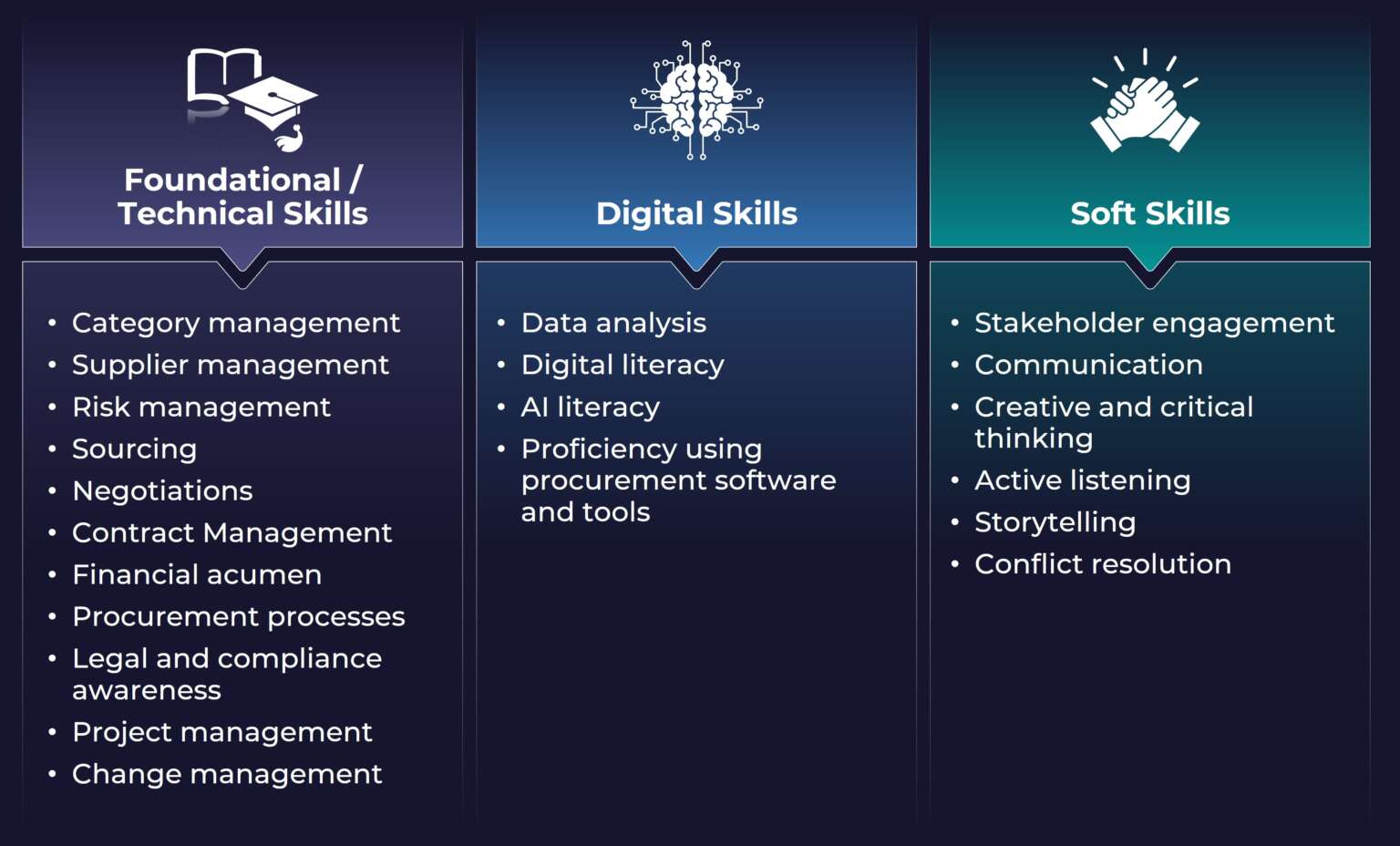
Blog
Skills frameworks and assessments for Procurement: What they are, why they matter, and how they work
By Mark Hubbard |
The skills required to succeed in procurement are evolving more rapidly than ever before. While foundational expertise in category, supplier, and contract management and sourcing remains important, it is no longer enough on its own. Today’s procurement professionals face a dynamic mix of rising business expectations, evolving regulatory demands, and rapid technological change, especially with the emergence of AI and digital tools.
At the same time, organisations are under increasing pressure to do more with fewer resources. With tight headcounts and a competitive talent market, leaders can’t simply hire their way to a future-ready team. Instead, the focus has shifted to reskilling and upskilling existing talent.
Skills frameworks and assessments are essential tools in this journey. They help identify skill gaps, unify diverse teams, and focus development efforts where they matter most. This blog explains what skills frameworks are, why they’re important, how skills assessments work in practice, and what benefits they offer.
What is a skills framework and why do you need one?
A skills framework is a structured outline of the key capabilities required in procurement roles, with clear descriptors of what proficiency looks like at each level. Procurement teams are rarely made up of individuals with identical backgrounds, training, or experience. A skills framework creates a shared language and aligns expectations, allowing individuals and teams to honestly assess their current skills and identify development priorities. With growing complexity in areas like ESG, risk, and digital transformation, a skills framework enables targeted learning that aligns with organisational strategy.
How to create a skills framework for Procurement
Creating a robust skills framework starts with clarity. You need clear, unambiguous descriptors for each skill mapped to specific job roles within your organisation to ensure expectations are fair and relevant for each individual. Vague or compound descriptors can lead to confusion and inconsistent self-assessments that fail to provide meaningful insights.

Established models, such as those from the CIPS (Chartered Institute of Procurement & Supply) and IFPSM (International Federation of Purchasing and Supply Management), offer strong starting points. These can be customised and expanded to reflect your organisation’s specific needs, strategic priorities, and cultural context.
Key skills to include
Many procurement skills frameworks focus heavily on technical and digital skills, but tend to ignore the importance of soft skills. Our 2024 Global Category Management Report identified stakeholder engagement and alignment as the primary barrier to success in category management and procurement. And with the advancement of technology, these skills become more important than ever.
A well-rounded skills framework should include a blend of foundational procurement skills (like category management, contracting, or negotiation), behavioural competencies (including stakeholder engagement, adaptability, and communication), and digital capabilities (such as data analysis and AI tool proficiency).
Here’s a breakdown of selected key skills to consider:

Adapting when competencies change
Procurement skills are not static — they evolve in response to the environment in which we operate. While many core competencies remain relevant over time, new requirements inevitably emerge due to changing business priorities and technological advancements. It’s essential to periodically review and refresh your skills framework to ensure it remains fit for purpose.
Skills assessments explained
Skills assessments measure individual proficiency against the defined framework, providing a clear picture of strengths and gaps. Common approaches include:
- Self-assessment: Individuals rate themselves against each defined skill using the framework’s descriptors. This method is easy to implement but may be influenced by differing interpretations or personal bias.
- Manager assessment: Line managers assess team members based on observed performance. While more objective, this is limited to the manager’s direct experience with the individual and may not capture the full picture.
- Moderated assessments: A blend of self and manager assessments, where results are calibrated through manager-led or external moderation to improve consistency and reduce subjectivity.
- 360-degree feedback: Collecting input from peers, direct reports, and other stakeholders. This holistic view offers richer insight, especially for soft skills and cross-functional collaboration.
Skills assessments should be completed at regular intervals. By re-evaluating individuals and teams regularly, you can track progress, measure the impact of development efforts, and adjust learning plans as needs evolve. This ongoing cycle of assessment and improvement supports individual growth and helps organisations build more capable, adaptable procurement functions.
Skills assessments are often supported by digital platforms, which simplify distribution, data capture, and analysis. Digital tools also enable rapid reporting across individuals, roles, regions, or business units, highlighting both common skill gaps and standout capabilities. One of the most valuable outcomes of skills assessments is their ability to reveal hidden talent — skills within teams that haven’t yet been fully utilised.
Benefits and challenges of skills assessments
The benefits of a skills assessment
A well-designed skills assessment delivers value at both the individual and organisational level. Key benefits include:
- Strategic alignment: By selecting the right set of competencies, assessments help ensure that procurement capabilities are aligned with broader business strategy, positioning the function to better support organisational goals.
- Career development: With a clear view of current capabilities, organisations can design meaningful development pathways, identify high-potential talent, and build robust succession plans.
- Consistency: Assessments create a shared language and a consistent benchmark for evaluating skills across teams, functions, and geographies.
- Smarter project resourcing: Understanding who has what skills enables better project matching (putting the right people on the right initiatives).
- Prioritised Learning: With visibility into strengths and gaps, leaders can more confidently focus training investments on the most critical skills gaps.
Potential challenges
While the benefits are compelling, skills assessments inevitably face challenges. Recognising them — and tackling them proactively — can help ensure success. Common challenges include:
- Resistance to participation: In some regions or cultures, assessments may be met with scepticism or concern. Framing the process as part of organisational development is key to gaining trust.
- Leadership buy-in: Leadership plays a critical role in setting the tone. If leaders don’t champion the initiative or allocate time for it, uptake will be limited. Clear communication about the strategic value of the assessment is essential.
- Misaligned or generic frameworks: If the skills framework doesn’t reflect the unique context of your organisation, it may cause confusion or disengagement. Tailoring the framework to your specific roles, goals, and maturity level is crucial.
- Lack of visible outcomes: For individuals and managers to fully engage, they need to see tangible results from the effort. Linking the assessment to development plans, promotions, or measurable improvements helps demonstrate its value and build momentum.
Putting it into practice with Future Purchasing
Understanding the skills your procurement team requires — and assessing current capabilities — is the first step to building a high-performing, future-ready function.
At Future Purchasing, we support organisations in designing and delivering skill profiles and assessments that provide clear, actionable insight into current competency levels. Our Compass Skills Assessment tool gives you a consistent and objective view of individual and team performance across key procurement capabilities, enabling you to identify strengths, surface hidden talent, and target development where it matters most.
But we don’t stop at diagnosis. Based on assessment results and aligned to your strategic goals, we help design tailored learning and development programs that close capability gaps and accelerate progress. Whether you’re aiming to raise the bar across the function or deepen expertise in specific areas, our approach ensures training is relevant, role-specific, and impactful.
By combining structured assessment with targeted upskilling, we help procurement teams unlock their potential and deliver measurable value, both now and in the future.
Ready to get started?
If you don’t have a skills framework aligned with your organisational structure and job roles yet, now is the time to act. Get in touch to discuss your current setup and how Future Purchasing’s Compass Skills Assessment and tailored learning programs can help you build a robust foundation for long-term performance.

About Mark Hubbard
Director
30+ years experience in procurement and supplier management, in line and consulting roles
Previous employment: Positive Purchasing Ltd, SITA,
QP Group, BMW, SWWS, Rover
Education: BSc in Engineering Metallurgy, MBA University of Plymouth
CIPS: Member




